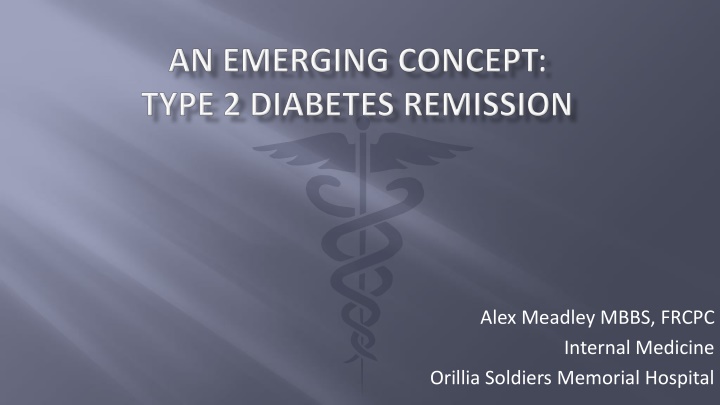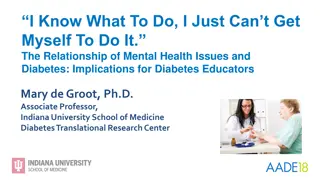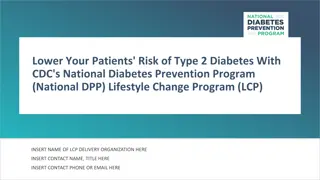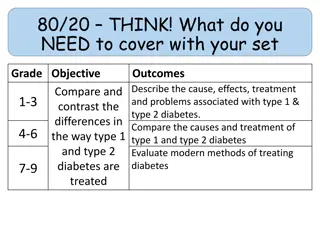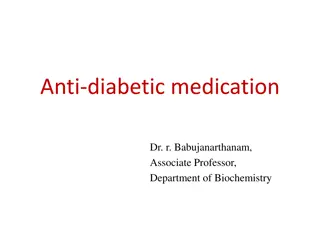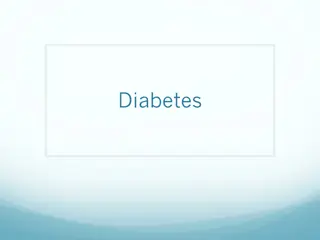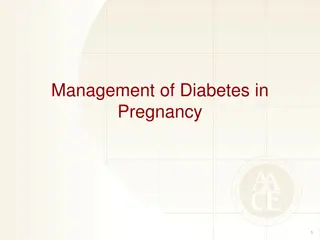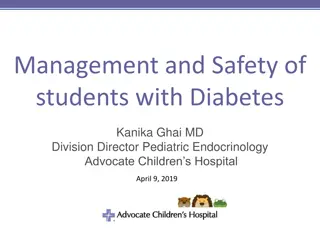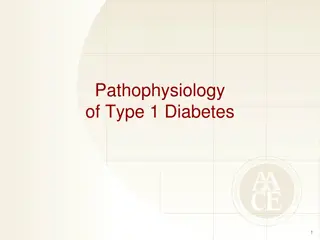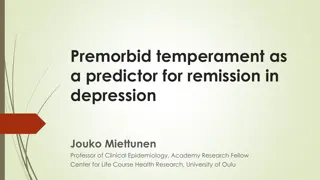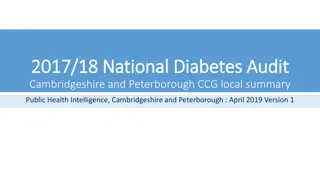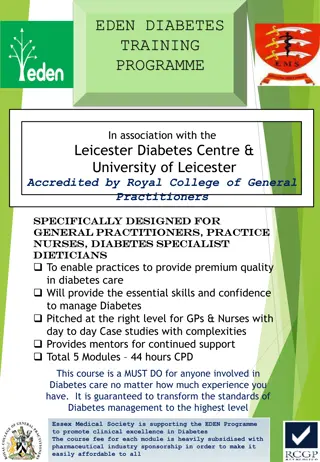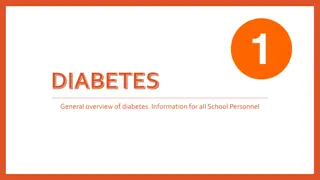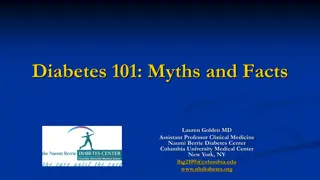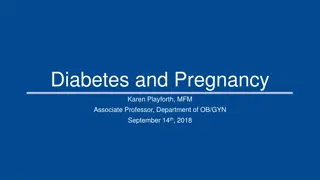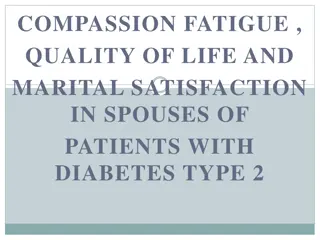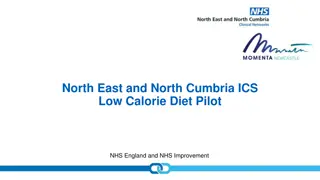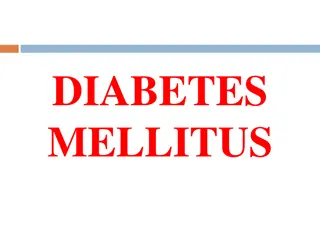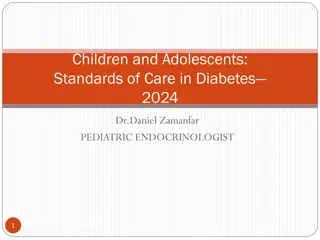Emerging Concepts in Type 2 Diabetes Remission
In-depth exploration of achieving Type 2 Diabetes remission through specific glycated hemoglobin thresholds and weight loss goals. Reviewing guidelines, risk factors, and considerations for de-escalation of antihyperglycemic agents, emphasizing individualized approaches.
Uploaded on Apr 04, 2025 | 2 Views
Download Presentation

Please find below an Image/Link to download the presentation.
The content on the website is provided AS IS for your information and personal use only. It may not be sold, licensed, or shared on other websites without obtaining consent from the author.If you encounter any issues during the download, it is possible that the publisher has removed the file from their server.
You are allowed to download the files provided on this website for personal or commercial use, subject to the condition that they are used lawfully. All files are the property of their respective owners.
The content on the website is provided AS IS for your information and personal use only. It may not be sold, licensed, or shared on other websites without obtaining consent from the author.
E N D
Presentation Transcript
Alex Meadley MBBS, FRCPC Internal Medicine Orillia Soldiers Memorial Hospital
I have received honoraria and participated in ad boards within the past 2 years Sanofi BI/Lilly Novo Nordisk
To review and discuss the emerging concept of TYPE 2 DIABETES REMISSION Definitions A1C targets Weight loss targets Weight loss recommendations
Diabetes Canada Clinical Practice Guidelines Expert Committee. Diabetes Canada 2018 Clinical Practice Guidelines for the Prevention and Management of Diabetes in Canada. Can J Diabetes. 2018;42(Suppl 1):S1- S325
BMI 32 BP 130-140/70-80 at home 72F in office PMHx DM2 since 2015 Briefly on insulin but oral Rx since Labs: A1C 6.4% ACR 1.2 eGFR 46 51 in 2017, 44 in 2021 Kidney Failure risk Equation: 2 year 0.2%, 5 year 0.6% LDL 0.87, Tg 2.98 (non-fasting) Ex smoker (2013) NSCLC remission since 2017 Meds Janumet XR 100/1000 mg daily Rosuvastatin 20 mg daily Vitamin D3
Achieving specified glycated hemoglobin (A1C) thresholds without any antihyperglycemic medications for a minimum of 3 months: remission to prediabetes (A1C between 6.0% and 6.4%) remission to normal glucose concentrations (A1C <6.0%)
an option for individuals with early type 2 diabetes who are overweight or obese weight loss with the goal of de-escalation and/or elimination of antihyperglycemic agents Caution in patients with significant eating or mental health disorders De-escalation should not include agents with additional benefit to the patient: atherosclerotic cardiovascular disease (ASCVD), heart failure (HF) and/or chronic kidney disease (CKD).
The approach to deprescribing antihyperglycemic agents should be individualized and incorporate the principles of minimizing the risk for hypoglycemia and avoiding medications with potential for weight gain/regain [Grade D, Consensus]. If type 2 diabetes remission criteria are met, A1C (or, if A1C unreliable, FPG or OGTT) should be performed at a minimum interval of every 6 months to assess persistence of diabetes remission or relapse of diabetes [Grade D, Consensus].
Type 2 diabetes remission following weight loss may be possible in a subset of these individuals through a variety of interventions, including bariatric surgery and low-calorie meal plans under the supervision of a trained dietitian or other health- care provider (HCP). Sustained weight loss of 15 kg of initial body weight is associated with the greatest probability of type 2 diabetes remission.
Bariatric surgery should be recommended to nonpregnant adults with type 2 diabetes and a BMI 35 kg/m2 as an option to potentially induce type 2 diabetes remission [Grade A, Level 1A] (26,30,63 66). Muller-Stich et al systematic review and meta-analysis of 5 RCTs involving participants with BMI <35 kg/m2, surgery was associated with a greater type 2 diabetes remission rate (107/221 vs 6/178; OR, 13.0; 95% CI, 4.48 37.41) than non-surgical medical treatment. Muller-Stich BP, Senft JD, Warschkow R, Kenngott HG, Billeter AT, Vit G, et al. Surgical versus medical treatment of type 2 diabetes mellitus in nonseverely obese patients: a systematic review and meta-analysis. Annals of surgery. 2015;261(3):421-429.
Low-calorie (800 to 850 kcal/day) diets with meal replacement products 3 to 5 months Target >15 kg body weight loss Followed by structured food reintroduction and increased physical activity for weight loss maintenance The above should be recommended as an option to potentially induce type 2 diabetes remission to selected nonpregnant adults with a BMI between 27 and 45 kg/m2, type 2 diabetes duration <6 years, A1C <12% and not using insulin [Grade A, Level 1A] (35 37).
Exercise training 240 to 420 min/week of structured physical activity spread over 5 days per week combined with a calorie-restricted diet 5% to 7% of initial body weight The above may be recommended as an option to potentially induce type 2 diabetes remission to selected nonpregnant adults with a BMI >25 kg/m2, type 2 diabetes duration <10 years, A1C <9% and not using insulin [Grade C, Level 2] (38).
BMI 32 BP 130-140/70-80 at home 72F in office PMHx DM2 since 2015 Briefly on insulin but OHA since Labs: A1C 6.4% ACR 1.2 eGFR 46 51 in 2017, 44 in 2021 Kidney Failure Risk Equation: 2 year 0.2%, 5 year 0.6% LDL 0.87, Tg 2.98 (non-fasting) Ex smoker (2013) NSCLC remission since 2017 Meds Janumet XR 100/1000 mg daily Rosuvastatin 20 mg daily Vitamin D3
Remission of type 2 diabetes is possible for some individuals achieving A1C in non-diabetes range after stopping glucose-lowering medication(s) Achieving remission is more likely for individuals: diagnosed with type 2 diabetes for a shorter time (e.g. less than 6 years); overweight/obese, who are able and inclined to lose weight; blood glucose levels closer to target; and who do not take insulin. Consider continuing certain glucose-lowering medication(s) with proven benefits on reducing heart and/or kidney disease complications
there are no trials of sufficient quality to support a recommendation to use pharmacotherapy as a means of inducing type 2 diabetes remission. Newer agents with more promising weight loss may bring A1C target vs weight target into the conversation Is it still remission if you are on agents for other benefits (weight loss, CV, renal)? This may make future research for outcomes and targets more challenging
